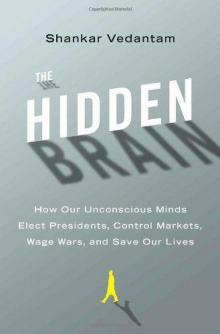The Hidden Brain: How Our Unconscious Minds Elect Presidents, Control Markets, Wage Wars, and Save Our Lives 

Genre: Other6
Published: 2009
View: 2294
Read OnlineRead The Hidden Brain: How Our Unconscious Minds Elect Presidents, Control Markets, Wage Wars, and Save Our Lives Storyline:
From Publishers WeeklyWashington Post science journalist Vedantam theorizes that there's a hidden world in our heads filled with unconscious biases, often small, hidden errors in thinking that manipulate our attitudes and actions without our knowing it. Autonomy is a myth, he says, because knowledge and rational intention are not responsible for our choices. This thesis is not news— since Freud, psychologists have taken the unconscious into account—but Vedanta argues that if we are influenced sometimes, then why not all the time, whether we're launching a romance or a genocide. This is a frightening leap in logic. In anecdotal, journalistic prose, we learn that, through bias, rape victims can misidentify their attacker; people are more honest even with just a subtle indication that they are being watched; polite behavior has to do with the frontotemporal lobes rather than with how one was raised; and that we can be unconsciously racist and sexist. Though drawing on the latest psychological research, Vedantam's conclusions are either trite or unconvincing. (Jan. 19) Copyright © Reed Business Information, a division of Reed Elsevier Inc. All rights reserved. FromA Washington Post science writer, Vedantam explores the findings of social psychologists about unconscious bias. Recounting people’s stories, he grips attention immediately. Introducing a rape victim whose mistake in identifying her assailant was revealed by DNA evidence that exonerated him, Vedantam establishes his theme of how people get things wrong (in the crime-and-punishment category, he adds death-penalty cases involving possible misidentification) or behave seemingly irrationally. After each individual story, the author repairs to relevant psychological studies. To Vedantam, the studies reveal that subtle biases unconsciously coexist alongside people’s conscious convictions that they are free of prejudice. He cites examples such as Senator George Allen, whose racial remark ended his career; the electorate’s perception of candidate Barack Obama; and the sexual discrimination case of Lilly Ledbetter. Branching into other arenas, such as crowd behavior during crisis situations and the minds of suicide bombers, Vedantam highlights a mental battle of which, he wants his readers to learn, they are largely unaware. This work has strong appeal for the psychology audience. --Gilbert TaylorPages of The Hidden Brain: How Our Unconscious Minds Elect Presidents, Control Markets, Wage Wars, and Save Our Lives :